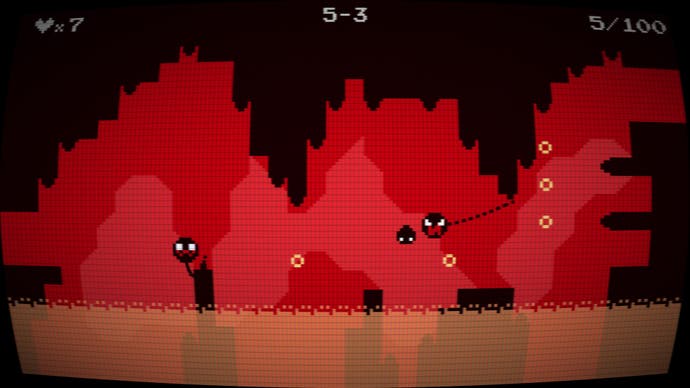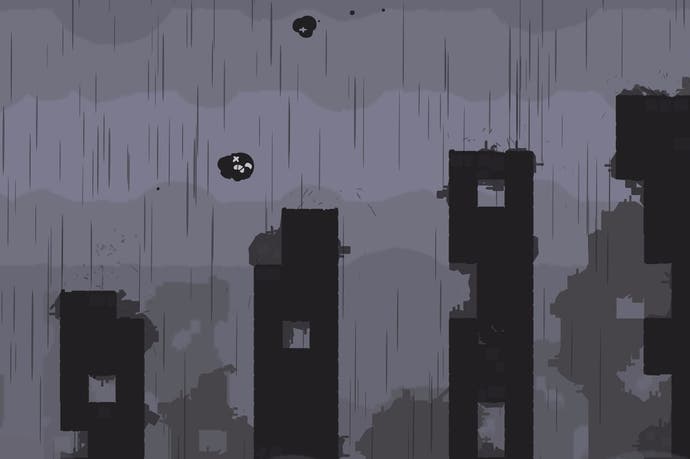The End is Nigh review
Making friends is hard.
The End is Nigh has quite the trailer. Presented as a fourth wall-breaking Let's Play video about a blob named Ash (voiced by Red Letter Media's Rich Evans) playing through a minimalist pixelated platformer called The End is Nigh, all seems well with the affable Ash until tragedy strikes and he gets a game-over. Only it's worse than that. The game crashes, sending Ash into a profanity-laden panic of the highest order. Initially it seems like a cute, clever marketing ploy parodying streamer culture, and it is, but it's also the opening cinematic to the game. Ash, as it turns out, is the last man (or blob. Or whatever) on earth, and his dinky little video games are all he has left.
It's both funny and sad to realise Ash's online handle, Ash_Dies_Alone, is eerily literal, and that he is in fact streaming to absolutely no one. It's a confusing and captivating tonal shift and one that may not come as a surprise seeing as how The End is Nigh is co-created by Super Meat Boy and The Binding of Isaac's creative lead Edmund McMillen. Like other McMillen protagonists, Ash is equal parts grotesque and adorable. His shapeless form and gouged out eye socket balanced by a winning smile and plucky enthusiasm - albeit one that turns into mortified panic at the drop of a hat. It's tragedy played for laughs: just silly enough to avoid clichéd grimdark banality, while melancholy enough to evoke real pathos.
What separates Ash from the bitter lead of that classic Twilight Zone episode where an anti-social bookworm's post-apocalyptic fantasy is thwarted by a broken pair of spectacles, is that Ash isn't simply looking to replace his broken video game (though collecting cartridges offers a wealth of optional mini-games). Instead, his desire is sadder and more human: he's looking for a friend. And if that requires cobbling together the severed limbs of cadavers and a collection of detached tumors, so be it.
This plays out in a series of single-screen platforming challenges that will seem very familiar to Super Meat Boy veterans. Each stage is riddled with exacting obstacles that require pixel-perfect precision as you navigate the crumbling ruins of an ashen metropolis. On paper it's all rather simple stuff as you avoid stray bullets, demonic monstrosities, polluted plots of air, and a whole lot of spikes. Yet the controls feel so precise that every extra millimeter of momentum and millisecond of timing constitutes the difference between life and death.
And oh boy will you die a lot in The End is Nigh! In the roughly eight hours it took me to complete the campaign I died a staggering 3548 times. That sounds like a lot, but many of these ill-fated Ashes lived for less than a few seconds thanks to the game's instantaneous respawn system. Die, try, die, try again. That's The End of Nigh's rendition of purgatory: one that will test your patience, but offer a salvation that's seemingly just out of reach.
Where The End is Nigh differs most strongly from Super Meat Boy is in its freedom of exploration. While not technically a "metroidvania" in the conventional sense, the game's series of single-screen challenges are loosely connected. Should you leap to the screen on your right, climb an obstacle, then jump back, you'll emerge in the prior screen from the same angle you entered it. You'll have to mess about with these interconnected opportunities a lot should you want to unearth all of The End is Nigh's many mysteries, and there are a lot of secret areas. (After all, this is a game that promotes "loads of hidden extras and endings that you will probably see someone else find before you do!")
If there's one unnecessarily frustrating aspect of this quasi open-world design it's that fast travel points are few and far between. You can always warp to the start of an area you've previously conquered, but can't select which specific part of it you'd like to access. As such, there's an unusually high amount of backtracking required for more diligent players scouring for secrets.

One major difference between The End is Nigh's platforming and that of Super Meat Boy is that Ash can't wall-jump on most surfaces and requires ledge corner or hook to snag onto the scenery. This offers less flexibility with how to handle each level, but given the dynamically shifting environments these marked points often prescribe a path for the player, teasing optimal routes and secret areas. It's an unusual alteration in a genre where wall-jumping has become the norm, but it works wonders in a game as brutal as this.
The biggest change from Super Meat Boy doesn't come into play until the game's final third (so if you're sensitive to design-related spoilers skip this paragraph) where your extra lives shift from infinite to limited based on how many collectibles you've acquired. Make it through one of these final 20-stage gauntlets and your stock replenishes. Fail and you're back to the start of a lengthy obstacle course. Were the whole game subject to such a strict limit, it would be unnecessarily stressful and tedious. But by only ratcheting up the stakes in the end, once the player has proven themselves proficient in the ways of blobby platforming, it raises the tension in a way that makes the third act feel like a proper climax rather than just an incrementally more challenging version of all that's come before. It's both terrifying and brilliant.
That's a good way to describe most of The End is Nigh, for that matter. The End is Nigh may be several years on from Super Meat Boy and developed with a different partner (this time it's Closure's creative lead Tyler Glaiel), but make no mistake: this is vintage McMillen. Not even the apocalypse can change that.



